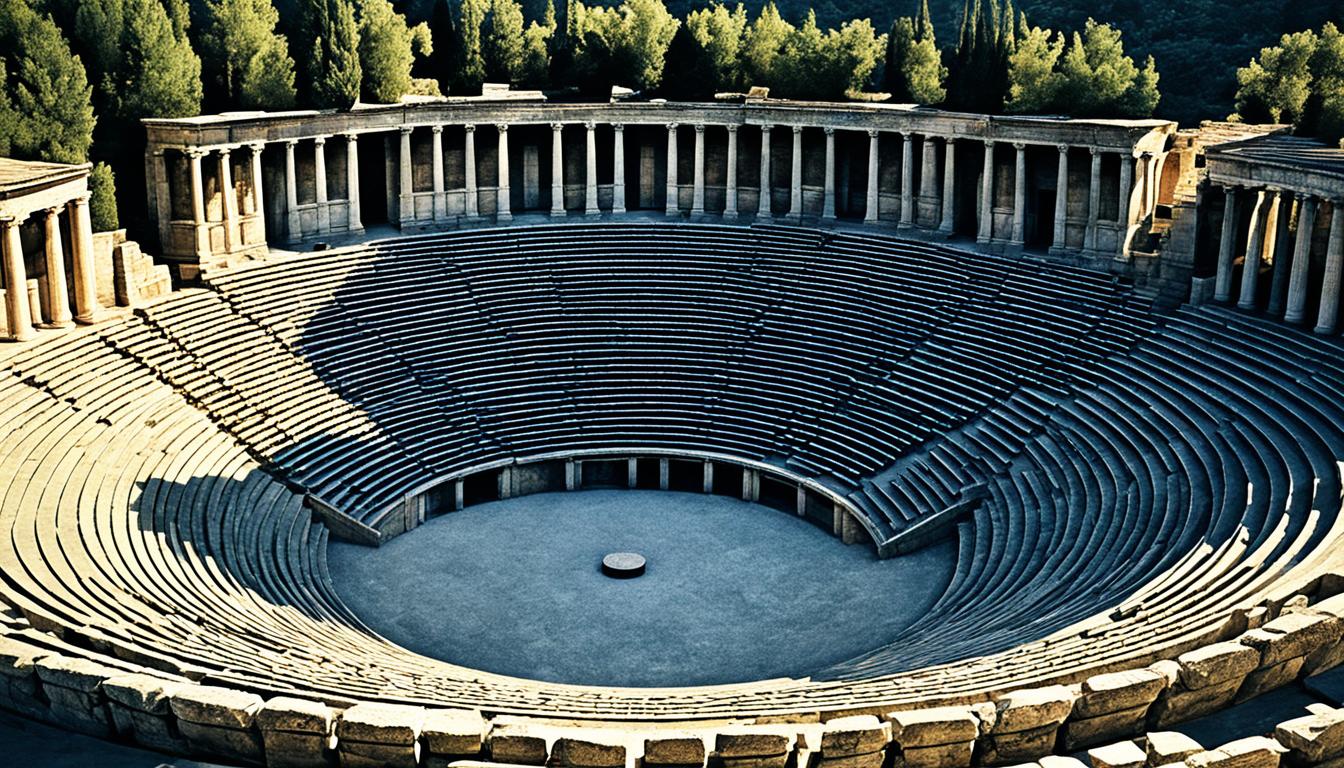Welcome to our article on ancient Greek theater! In this section, we will explore the oldest surviving Greek drama and dive into the rich history of classical Greek plays and their influential playwrights. Let’s embark on a journey back in time to discover the origins and evolution of Greek theater, and how it has shaped the world of performing arts.
Key Takeaways:
- The oldest surviving Greek drama is “The Persians” by Aeschylus, performed in 472 BC.
- Ancient Greek theater originated in Athens during the 5th century BC.
- Greek drama evolved with the introduction of innovative techniques by playwrights like Aeschylus, Sophocles, and Euripides.
- Wealthy patrons played a significant role in sponsoring theatrical productions in ancient Greece.
- Greek theater held great cultural and political significance in ancient Athens and continues to influence Western drama today.
The Origins of Greek Theater
Greek theater originated in Athens during the 5th century BC. It marked the birth of a new form of entertainment and artistic expression that would have a lasting impact on the world of performing arts.
The early plays in ancient Greek theater had a simple yet powerful structure. They featured one actor, known as the protagonist, who portrayed multiple characters and interacted with a chorus. The chorus, consisting of a group of performers, narrated the story, providing commentary and reflecting the emotions of the characters.
A pivotal figure in the development of Greek theater was Aeschylus, one of the renowned playwrights of ancient Greece. Aeschylus introduced innovative techniques that transformed the art form. He introduced a second speaking role called the antagonist, which added dynamic interactions between characters on stage. Additionally, Aeschylus reduced the size of the chorus, allowing more focus on the individual actors and their performances.
The Theater of Dionysus in Athens was the first dedicated venue for these theatrical performances. It was a grand amphitheater situated at the foot of the Acropolis, where audiences could gather to watch the plays. The Theater of Dionysus became a center of cultural and artistic expression, hosting performances of both tragedy and comedy.
As the popularity of Greek theater grew, theaters began to spread throughout Greece. Each city-state developed its own theaters and hosted performances during festivals and religious celebrations. These theaters became essential places for the community to gather, witness great performances, and celebrate the rich cultural heritage of ancient Greece.
The Origins of Greek Theater in a Nutshell
- Greek theater originated in Athens during the 5th century BC.
- Early plays had one actor and a chorus.
- Aeschylus introduced a second speaking role and reduced the chorus size.
- The Theater of Dionysus in Athens was the first dedicated venue.
- Theaters spread throughout Greece, becoming central to cultural celebrations.
A Brief Timeline of Greek Theater
| Year | Event |
|---|---|
| 5th century BC | Origin of Greek theater in Athens |
| 472 BC | First performance of Aeschylus’ “The Persians” |
| Mid-5th century BC | Theater of Dionysus becomes a prominent venue |
| 4th century BC | Spread of theaters throughout Greece |
The Evolution of Greek Drama
As Greek theater continued to thrive in ancient Greece, playwrights like Sophocles and Euripides played a pivotal role in the evolution of Greek drama. They introduced innovative elements that further enriched the theatrical experience.
Innovations in Greek Drama
Sophocles and Euripides introduced several groundbreaking innovations that transformed classical Greek plays.
- Third Actor: In earlier Greek theater, plays had only two speaking roles: the protagonist and the antagonist. However, Sophocles and Euripides added a third actor to the stage, expanding the range of characters and interactions within a play.
- Prologues and Exposition: To provide the audience with important background information, playwrights began incorporating prologues at the beginning of their works. These prologues introduced the play’s subject and set the stage for the upcoming events.
- Deus ex Machina: To resolve complex or unresolved plot points, the concept of the “deus ex machina” emerged. This involved the sudden appearance of a god or divine intervention to bring about a resolution. It added an element of surprise and heightened dramatic tension to the plays.
The Three Genres
Greek drama was classified into three distinct genres: comedy, tragedy, and satyr plays. Each genre had its unique characteristics and served different purposes.
| Genre | Description |
|---|---|
| Comedy | Comedy plays were known for their humorous and lighthearted tone. They often ridiculed social norms, mocked prominent figures, and satirized everyday life in ancient Athens. |
| Tragedy | Tragedies focused on monumental or legendary themes, exploring the depths of human emotions and often centered around well-known myths and gods. They depicted the struggles of noble protagonists and conveyed powerful moral messages. |
| Satyr Plays | Satyr plays provided a lighter interlude during the festivals. They were characterized by their irreverent and bawdy nature, often featuring a chorus of satyrs—a mythical creature associated with revelry and hedonism. |
The classification of plays into these genres allowed Greek playwrights to cater to a diverse range of audience preferences and provided a comprehensive repertoire of dramatic offerings.
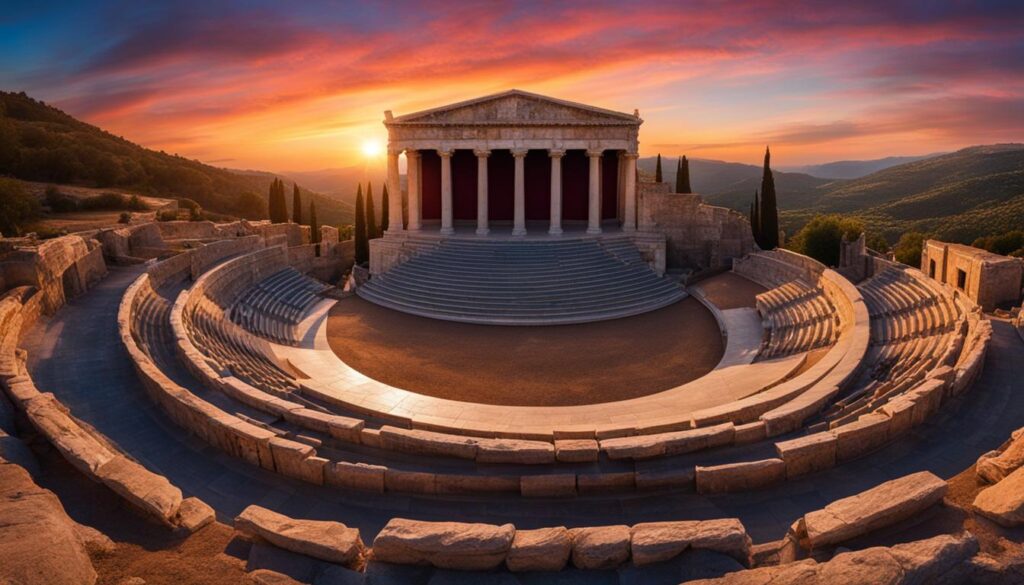
Greek Drama: A Cultural Legacy
“Greek drama has not only entertained audiences for centuries but has also shaped the very foundation of modern Western theater. Its impact continues to be felt in the techniques, themes, and genres used today.”
The evolution of Greek drama witnessed a profound impact on subsequent theatrical traditions. The remarkable contributions of playwrights like Sophocles and Euripides, along with the distinct genres of comedy, tragedy, and satyr plays, have left a lasting cultural imprint.
Role of Wealthy Patrons
In ancient Greek theater, the success of theatrical productions relied heavily on the support of wealthy patrons. These affluent citizens sponsored plays by paying a tax known as the choregia. By financing these performances, these influential individuals sought to gain popularity and political influence within Athenian society.
“Generous benefactors saw theatrical productions as a means to showcase their wealth and power, solidify their social status, and curry favor with the public. One example of such influence is Pisistratus, the tyrant who established the renowned ‘City Dionysia’ festival. His patronage of the arts not only elevated his own standing but also contributed to the overall cultural development.”
The choregia tax was imposed on the wealthiest citizens of Greece, enabling them to contribute substantial funds towards the production costs of a play. In return for their patronage, these sponsors had their names or family names engraved onto the theatrical equipment or buildings associated with the performances.
Furthermore, the wealthy patrons had the responsibility of selecting and organizing the chorus, providing them with costumes, and ensuring the successful staging of the play. By taking an active role in the production process, these patrons exercised their influence and solidified their place in the cultural landscape of ancient Greece.
The support of wealthy patrons not only financially sustained the ancient Greek theater but also contributed to the flourishing of dramatic arts. Their sponsorship allowed playwrights to focus on creating masterpieces, pushing the boundaries of theatrical innovation, and captivating audiences with their timeless stories. The influence of these patrons extended beyond the performance venues, shaping the cultural heritage of ancient Greece.
| Benefits of Patronage | Responsibilities of Sponsors |
|---|---|
|
|
The Power of Greek Theater
Greek theater held a significant cultural and political role in ancient Athens. The theater was an integral part of the Dionysia festival, a grand celebration honoring the god Dionysus. The festival was a time of revelry, feasting, and religious rituals, and the dramatic performances were a central highlight.
Tragedy, comedy, and satyr plays were the three main genres of Greek dramatic performances. Tragedies explored themes of human suffering, fate, and morality, often featuring iconic characters from Greek mythology. Comedies, on the other hand, satirized societal issues and ridiculed prominent figures in Athenian society. Satyr plays combined humor and mythological elements, providing a lighter entertainment option.
These dramatic performances not only entertained the audience but also served as a powerful tool for social commentary and political criticism. Through their performances, playwrights highlighted the flaws and virtues of individuals and society, sparking introspection and discussion among the citizens.
The cultural significance of Greek theater extends beyond its entertainment value. It served as a means of education, conveying moral lessons and philosophical concepts to the audience. The plays explored fundamental questions about human nature, ethics, and the universe, inviting the spectators to reflect and contemplate.
The influence of ancient Greek theater on modern Western theater cannot be overstated. Many theatrical conventions, character archetypes, and plot structures that originated in ancient Greece continue to shape contemporary plays and performances.
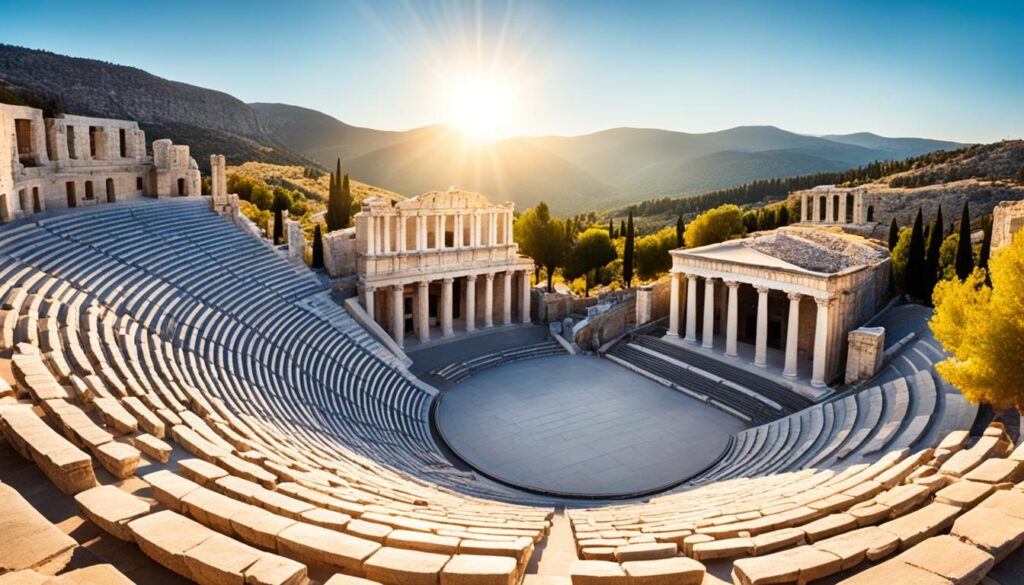
| Impact of Ancient Greek Theater | Examples |
|---|---|
| Continuation of Greek dramatic genres | Tragedy and comedy remain fundamental genres in Western theater |
| Introduction of complex, flawed characters | Characters like Oedipus in Sophocles’ tragedies influenced the portrayal of flawed protagonists in later works |
| Emphasis on storytelling and dialogue | The focus on narrative and dialogue in Greek theater shaped the storytelling traditions in Western drama |
| Use of theatrical masks | The tradition of using masks to represent different characters evolved from ancient Greek theater |
The Influence of Greek Theater on Western Drama
Ancient Greek theater has had a profound impact on the development of Western drama. Its technical advancements, classification into genres, and exploration of themes continue to shape modern theatrical productions.
The dramatic genres of tragedy and comedy, which originated in ancient Greek theater, hold a prominent place in the history of Western drama. Tragedy explores the complexities of human existence, delving into themes of fate, morality, and the struggle between gods and mortals. Comedy, on the other hand, serves as a source of laughter and satire, mocking societal norms and offering a lighthearted escape.
One of the most significant contributions of ancient Greek theater to Western drama is the use of technical terms and theatrical conventions. Concepts such as “dramatis personae” (the cast of characters), “prologue” (the introduction to the play), and “deus ex machina” (a divine intervention to resolve the plot) all originated in ancient Greek theater and continue to be used in contemporary productions.
“The technical aspects of ancient Greek theater, from the staging to the use of masks, have laid the foundation for modern theatrical practices.” – Theater Historian
A notable example of the influence of Greek theater on Western drama is the works of William Shakespeare. Shakespeare’s plays, with their intricate plots, conflicted characters, and exploration of both tragedy and comedy, draw heavily from Greek dramatic traditions. Elements such as soliloquies, asides, and the use of a chorus to comment on the action can all be traced back to ancient Greek theater.
Furthermore, Greek theater introduced archetypal characters and themes that have become enduring tropes in Western drama. From the tragic hero, like Oedipus in Sophocles’ “Oedipus Rex,” to the clever servant, like Figaro in Beaumarchais’ “The Marriage of Figaro,” these character types have found a permanent place in the theatrical canon.
Key Examples of Greek Dramatic Genres in Western Drama
| Greek Dramatic Genre | Key Examples in Western Drama |
|---|---|
| Tragedy | Shakespeare’s “Hamlet,” Miller’s “Death of a Salesman” |
| Comedy | Molière’s “Tartuffe,” Wilde’s “The Importance of Being Earnest” |
It is undeniable that the influence of ancient Greek theater on Western drama is far-reaching and profound. The legacy of Greek dramatic genres, technical innovations, and thematic explorations continues to shape the theatrical landscape, ensuring that the spirit of Greek theater lives on in modern stages around the world.
Theatrical Culture and Festivals in Ancient Greece
Theatrical culture thrived in ancient Greece, particularly in Athens. Festivals played a significant role in celebrating the performing arts and honoring the god Dionysus, the patron of theater. One of the most prominent festivals was the City Dionysia, a grand event that showcased dramatic performances.
The City Dionysia festival, held annually in Athens, was a celebration of Greek theater and a tribute to Dionysus. It took place over several days and featured competitions between playwrights, actors, and poets. Tragedy, comedy, and satyr plays were central to the festival, captivating audiences with their compelling stories and captivating performances.
Tragedies explored profound themes of human suffering, fate, and morality, leaving a lasting impact on the audience. They were often based on Greek mythology and featured intense emotions and dramatic conflicts. Playwrights such as Aeschylus, Sophocles, and Euripides are renowned for their tragic works that continue to influence theater today.
Tragedies were seen as a medium for catharsis, allowing the audience to experience a release of emotions and gain a deeper understanding of the human condition.
Comedies, on the other hand, provided light-hearted entertainment and social commentary. They mocked societal norms, political figures, and everyday life, bringing laughter and satire to the audience. Aristophanes, a prominent comic playwright, wrote plays that challenged the status quo and utilized humor as a means of critique.
Satyr plays combined elements of tragedy and comedy, often parodying mythical stories and incorporating bawdy humor. They provided a comedic relief after the intense emotions of tragic performances, ensuring a diverse range of entertainment for festival-goers.
The City Dionysia festival was not only a cultural event but also a religious one, as it honored Dionysus, the ancient Greek god of wine, theater, and fertility. The festival attracted a wide audience, including both Athenian citizens and visitors from other Greek city-states.
The theatrical performances during the festival were highly anticipated and saw the participation of esteemed playwrights, actors, and musicians. The festival offered an opportunity for artists to showcase their talent and compete for recognition and fame.
Overall, the festivals and theatrical culture of ancient Greece, epitomized by the City Dionysia, played a central role in promoting the performing arts and celebrating the rich tradition of Greek theater.
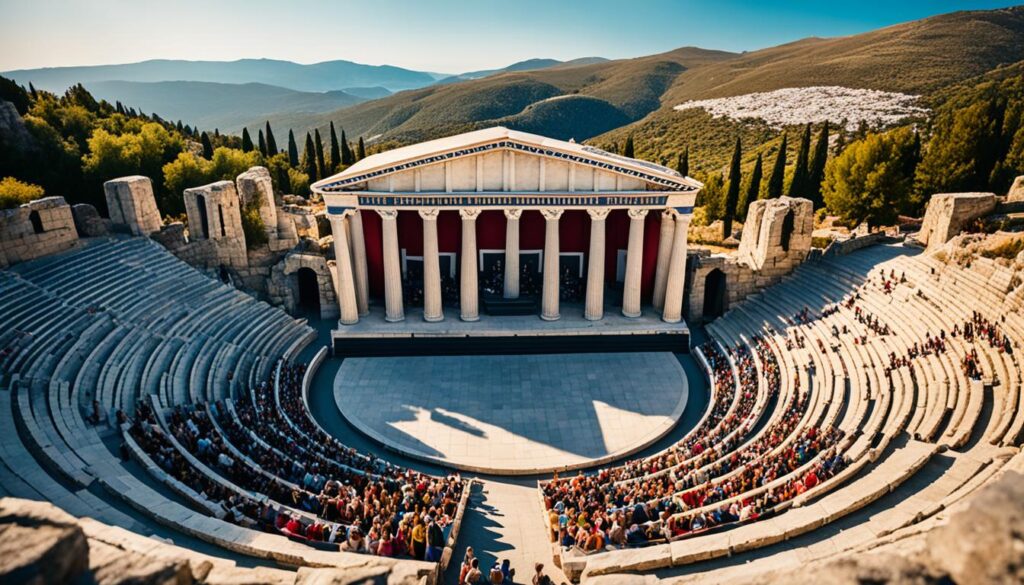
Theatrical Spaces and Architecture
Greek theaters were ingeniously designed to make the most of their natural surroundings, incorporating both practicality and aesthetics. Built into hillsides, these ancient structures provided an ideal vantage point for the audience to enjoy the performances.
The Greek theaters consisted of several distinct elements, each serving a specific purpose:
- Orchestra: This was a circular, flat area at the center of the theater, serving as a dancing floor for the chorus.
- Theatron: The theatron was the seating area for the spectators, often semicircular in shape. It provided an elevated view of the orchestra and the stage.
- Skene: Positioned behind the orchestra, the skene served as a backdrop for the performances. It was a building with a structure resembling a stage house.
- Paraskenia: These were side wings on either side of the skene. The paraskenia included doorways that allowed actors to make dramatic entrances and exits.
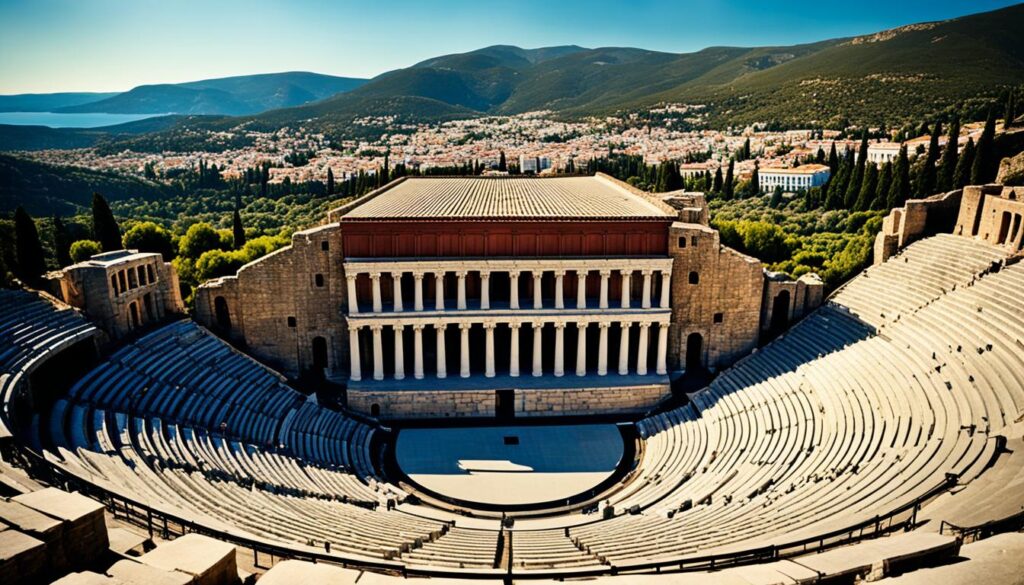
The design of Greek theaters showcased the artistry of both architecture and engineering, with meticulous attention to acoustics and visual impact. The overall layout created an immersive experience for the audience, ensuring that everyone had a clear view and could hear the actors and chorus clearly.
“Greek theaters were masterpieces of design, perfectly balancing form and function. The open-air settings and strategic placement of each architectural element added grandeur to the performances, making the theater experience truly unforgettable.”
Whether perched on the slopes of hills or nestled within bustling cities, Greek theaters exemplified the ingenuity and artistic vision of the ancient Greek civilization. They continue to inspire awe and admiration to this day, serving as a testament to the enduring legacy of ancient Greek theater.
Greek Tragedy and Comedy
In ancient Greek theater, two distinct genres emerged: tragedy and comedy. While both forms held significant cultural relevance, they differed in their themes, tone, and purpose.
Greek Tragedy
Greek tragedy encompassed plays that portrayed heroic myths and gods. These dramatic works explored deep emotions, moral dilemmas, and the consequences of human actions. The dialogue between the protagonist and the chorus played a central role, as the chorus represented the collective voice of society, commenting on and reflecting the protagonist’s journey. Tragedies often delved into profound questions of life, fate, and the nature of humanity.
Greek Comedy
On the other hand, Greek comedy provided a lighthearted and satirical take on society. Comedies ridiculed mythology, prominent figures, and social norms of Athenian society. Humorous situations, wordplay, and raunchy humor often featured in these theatrical productions, providing entertainment and social commentary. Comedy aimed to critique and mock various aspects of Athenian life, challenging societal norms and offering a light-hearted escape for the audience.
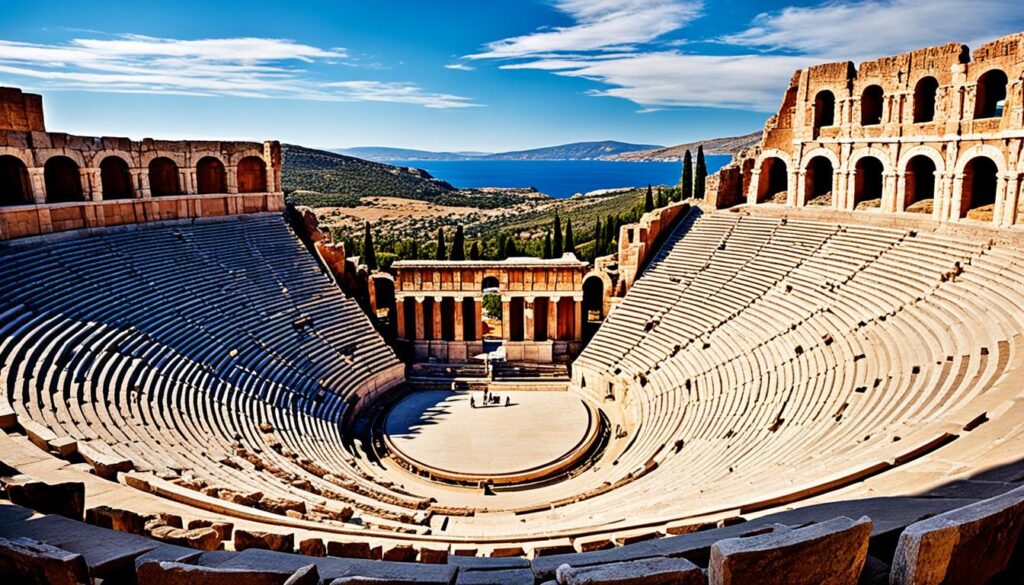
“Through tragedy and comedy, ancient Greek theater allowed audiences to explore the depths of human experience, from ultimate tragedy to the absurdities of everyday life.”
| Comparison of Greek Tragedy and Comedy | ||
|---|---|---|
| Genre | Greek Tragedy | Greek Comedy |
| Main Themes | Heroic myths, gods, human emotions, moral dilemmas | Mockery of mythology, societal figures, social norms |
| Tone | Serious, somber | Lighthearted, satirical |
| Audience Reaction | Elicited catharsis, reflection, and emotional engagement | Provided entertainment, laughter, and social critique |
The Evolution of Comedy in Greek Theater
Greek comedy underwent significant transformations throughout its history, showcasing the evolution of humor and social commentary in ancient Greek theater. The two main periods of Greek comedy are known as Old Comedy and New Comedy, each with its distinct characteristics and thematic focus.
Old Comedy: Satire and Political Critique
Old Comedy, which flourished in the 5th century BC, was renowned for its satirical and crude nature. Playwrights like Aristophanes used humor and mockery to criticize societal norms, political figures, and contemporary events. Their plays were a platform for social and political commentary, often pushing boundaries and challenging the status quo.
Old Comedy plays featured exaggerated characters, witty wordplay, and outrageous situations to entertain and provoke laughter. They utilized comedic devices such as puns, parodies, and comedic timing to draw audiences into their satirical narratives. By exaggerating flaws and highlighting absurdities, Old Comedy aimed to ridicule and expose societal issues, making it a powerful tool for dissent and social critique.
“Old Comedy embodied the spirit of political satire and societal critique, offering a platform for playwrights to lampoon influential figures and challenge prevailing norms.”
New Comedy: Everyday Life and Romantic Intrigues
In contrast to the satirical nature of Old Comedy, New Comedy emerged in the 4th century BC as a gentler, more relatable form of comedic expression. Menander, one of the prominent playwrights of New Comedy, focused on portraying ordinary people and their everyday lives, with an emphasis on romantic dilemmas and family relationships.
New Comedy plays delved into the intricacies of love, friendship, and social tensions, exploring relatable themes that resonated with audiences. The humor in New Comedy was often derived from misunderstandings, mistaken identities, and the foibles of human nature. These plays established a more naturalistic approach, emphasizing dialogue and character development.
Unlike Old Comedy, New Comedy did not target specific political figures or criticize societal issues directly. Instead, it entertained audiences through insightful observations of human behavior and the complexities of personal relationships.
Menander’s works, which spanned over 100 plays, were widely acclaimed and considered masterpieces of New Comedy. Unfortunately, the majority of his plays did not survive, and only fragments and adaptations remain.
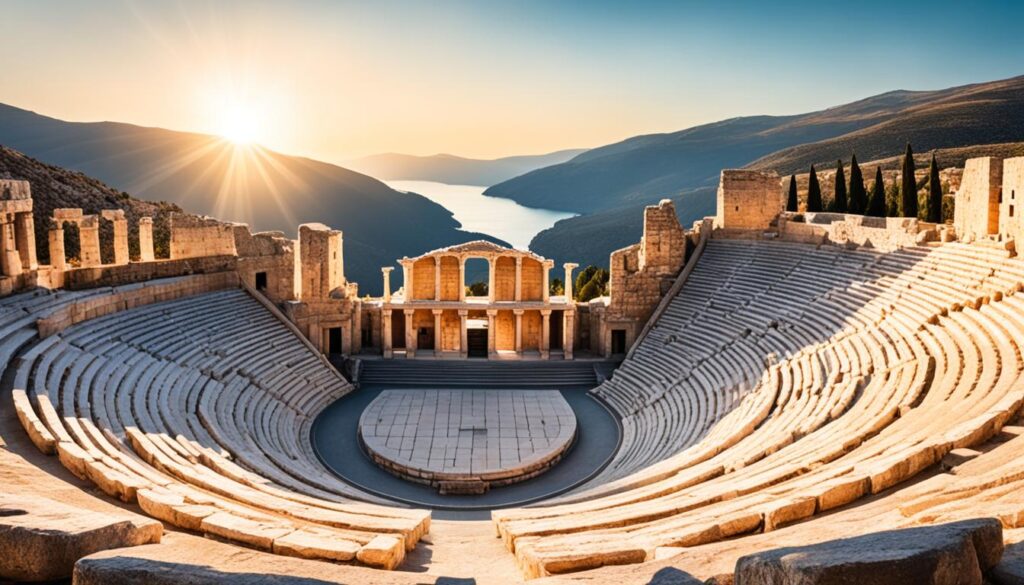
| Key Differences Between Old Comedy and New Comedy | |
|---|---|
| Old Comedy | New Comedy |
| Satirical and crude | Gentler and more relatable |
| Political critique | Focus on everyday life |
| Exaggerated characters and situations | Realistic portrayal of ordinary people |
| Challenging societal norms | Exploring personal relationships |
The transformation from Old Comedy to New Comedy reflects the changing social and cultural landscape of ancient Greece. While Old Comedy thrived on satire and political critique, New Comedy shifted its focus to the complexities of human relationships and everyday life.
Greek Theater in the Hellenistic Period
During the Hellenistic period, Greek theater persevered despite the decline of Athens. However, a significant shift occurred with the rise of New Comedy as the primary form of performance.
New Comedy, exemplified by the works of Menander, introduced a more light-hearted and relatable approach to storytelling. It focused on everyday life, love, and social tensions, departing from the grand narratives and mythical themes of earlier Greek drama.
“The New Comedy era brought forth relatable and humorous plays that resonated with audiences. Menander’s works, such as ‘The Grouch’ and ‘The Girl from Samos,’ explored the complexities of human relationships and the foibles of everyday life.”
This shift in comedic style also had a notable influence on Roman comedy, highlighting the enduring impact of Greek theater on subsequent theatrical traditions.
Not only did the content of performances evolve, but the theaters themselves underwent changes during this period. The size and design of theaters were modified to accommodate diverse storytelling approaches, catering to the demands of both tragedy and comedy.
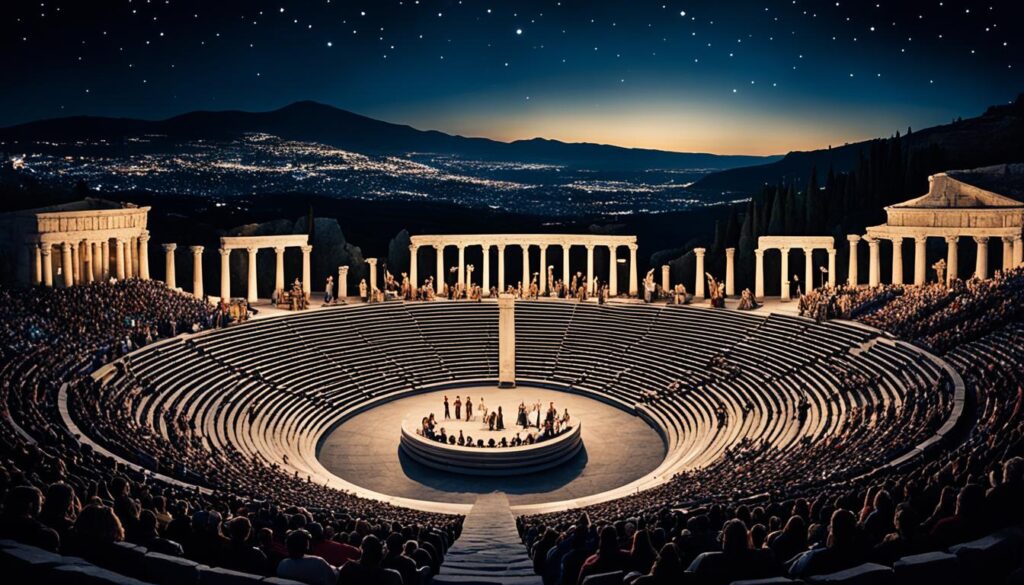
Evolution of Greek Theater in the Hellenistic Period
As Greek theater entered the Hellenistic period, the performances became more dynamic and engaging. Skilled actors further refined their craft, exhibiting a range of emotions and techniques to captivate audiences.
New advancements in stagecraft and scenography enhanced the visual experience, incorporating elaborate sets, props, and costumes. The use of mechanized devices, such as the deus ex machina, became more prevalent in this era, allowing for grander and more theatrical resolutions.
| Key Features of Greek Theater in the Hellenistic Period | Examples |
|---|---|
| Shift to New Comedy | Plays by Menander |
| Evolution of Theater Design | Theaters adapted to accommodate diverse performances |
| Advancements in Stagecraft | Incorporation of elaborate sets, props |
| Technological Innovations | Increased use of mechanized devices, such as the deus ex machina |
The Hellenistic period marked a transitional phase for Greek theater, with New Comedy serving as a bridge between the classical tragedians and the emerging comedic traditions of later centuries.
Conclusion
The ancient Greek theater is a testament to the rich and enduring heritage of Greek drama. It laid the foundation for Western drama and continues to be a source of inspiration for theatrical productions today. Through innovative techniques, Greek playwrights like Aeschylus, Sophocles, and Euripides pushed the boundaries of storytelling and performance, creating complex narratives and exploring the depths of human emotions.
The genres of tragedy and comedy, which originated in ancient Greek theater, still resonate with audiences worldwide. Greek tragedy delves into profound themes and utilizes the dialogue between protagonists and the chorus to provoke introspection and reflection. On the other hand, Greek comedy uses satire and humor to critique societal and political issues, offering a lighthearted perspective on the world.
Furthermore, the societal impact of Greek theater cannot be underestimated. The influential role of wealthy patrons in sponsoring theatrical productions allowed them to gain popularity and political influence. The cultural significance of Greek theater was further amplified through grand festivals like the City Dionysia, dedicated to honoring the god Dionysus. These festivals showcased dramatic performances as a way to celebrate and engage with the community.
The legacy of ancient Greek theater and its dramatic heritage is evident in the terminology, genres, and themes that have shaped modern Western drama. Theater architecture, with its distinct elements such as the orchestra, theatron, and skene, continues to influence contemporary stage designs. The power of Greek theater lives on, reminding us of the enduring impact of ancient storytelling and the profound connection between art and society.
Source Links
- https://www.pbs.org/empires/thegreeks/background/24b_p1.html
- https://en.wikipedia.org/wiki/Theatre_of_ancient_Greece
- https://www.metmuseum.org/toah/hd/thtr/hd_thtr.htm
